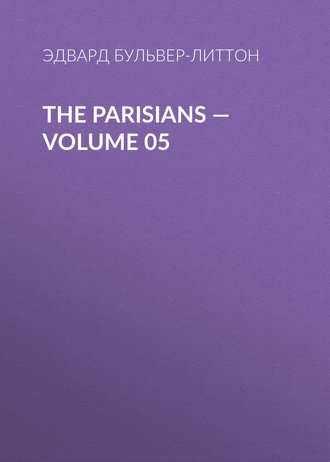
Эдвард Бульвер-Литтон
The Parisians — Volume 05
Alain bowed his head at this eulogium. Such had been the character that a few months ago he would have sought as example and model. He seemed to gaze upon a flattered portrait of himself as he had been.
"But," said Enguerrand, "I have not come here to indulge in the overflow of brotherly affection. I come to take you to your relation, the Duchesse of Tarascon. I have pledged myself to her to bring you, and she is at home on purpose to receive you."
"In that case I cannot be such a churl as to refuse. And, indeed, I no longer feel quite the same prejudices against her and the Imperialists as I brought from Bretagne. Shall I order my carriage?"
"No; mine is at the door. Yours can meet you where you will, later. Allons."
CHAPTER III
The Duchesse de Tarascon occupied a vast apartment in the Rue Royale, close to the Tuileries. She held a high post among the ladies who graced the brilliant court of the Empress. She had survived her second husband the duke, who left no issue, and the title died with him.
Alain and Enguerrand were ushered up the grand staircase, lined with tiers of costly exotics as if for a fete; but in that and in all kinds of female luxury, the Duchesse lived in a state of fete perpetuelle. The doors on the landing-place were screened by heavy portieres of Genoa velvet, richly embroidered in gold with the ducal crown and cipher. The two salons through which the visitors passed to the private cabinet or boudoir were decorated with Gobelin tapestries, fresh, with a mixture of roseate hues, and depicting incidents in the career of the first emperor; while the effigies of the late duke's father—the gallant founder of a short-lived race figured modestly in the background. On a table of Russian malachite within the recess of the central window lay, preserved in glass cases, the baton and the sword, the epaulettes and the decorations of the brave Marshal. On the consoles and the mantelpieces stood clocks and vases of Sevres that could scarcely be eclipsed by those in the Imperial palaces. Entering the cabinet, they found the Duchesse seated at her writing-table, with a small Skye terrier, hideous in the beauty of the purest breed, nestled at her feet. This room was an exquisite combination of costliness and comfort,—Luxury at home. The hangings were of geranium-coloured silk, with double curtains of white satin; near to the writing-table a conservatory, with a white marble fountain at play in the centre, and a trellised aviary at the back. The walls were covered with small pictures,—chiefly portraits and miniatures of the members of the imperial family, of the late Duc, of his father the Marshal and Madame la Marechale, of the present Duchesse herself, and of some of the principal ladies of the court.
The Duchesse was still in the prime of life. She had passed her fortieth year, but was so well "conserved" that you might have guessed her to be ten years younger. She was tall; not large, but with rounded figure inclined to en bon point; with dark hair and eyes, but fair complexion, injured in effect rather than improved by pearl-powder, and that atrocious barbarism of a dark stain on the eyelids which has of late years been a baneful fashion; dressed,—I am a man, and cannot describe her dress; all I know is that she had the acknowledged fame of the best- dressed subject of France. As she rose from her seat there was in her look and air the unmistakable evidence of grande dame,—a family likeness in feature to Alain himself, a stronger likeness to the picture of her first cousin (his mother) which was preserved at Rochebriant. Her descent was indeed from ancient and noble houses. But to the distinction of race she added that of fashion, crowning both with a tranquil consciousness of lofty position and unblemished reputation.
"Unnatural cousin!" she said to Alain, offering her hand to him, with a gracious smile,—"all this age in Paris, and I see you for the first time. But there is joy on earth as in heaven over sinners who truly repent. You repent truly—n'est ce pas?"
It is impossible to describe the caressing charm which the Duchesse threw into her words, voice, and look. Alain was fascinated and subdued.
"Ah, Madame la Duchesse," said he, bowing over the fait hand he lightly held, "it was not sin, unless modesty be a sin, which made a rustic hesitate long before he dared to offer his homage to the queen of the graces."
"Not badly said for a rustic," cried Enguerrand; "eh, Madame?"
"My cousin, you are pardoned," said the Duchesse. "Compliment is the perfume of gentilhommerie; and if you brought enough of that perfume from the flowers of Rochebriant to distribute among the ladies at court, you will be terribly the mode there. Seducer!"—here she gave the Marquis a playful tap on the cheek, not in a coquettish but in a mother- like familiarity, and looking at him attentively, said: "Why, you are even handsomer than your father. I shall be proud to present to their Imperial Majesties so becoming a cousin. But seat yourselves here, Messieurs, close to my arm-chair, caussons."
The Duchesse then took up the ball of the conversation. She talked without any apparent artifice, but with admirable tact; put just the questions about Rochebriant most calculated to please Alain, shunning all that might have pained him; asking him for descriptions of the surrounding scenery, the Breton legends; hoping that the old castle would never be spoiled by modernizing restorations; inquiring tenderly after his aunt, whom she had in her childhood once seen, and still remembered with her sweet, grave face; paused little for replies; then turned to Enguerrand with sprightly small-talk on the topics of the day, and every now and then bringing Alain into the pale of the talk, leading on insensibly until she got Enguerrand himself to introduce the subject of the emperor, and the political troubles which were darkening a reign heretofore so prosperous and splendid.
Her countenance then changed; it became serious, and even grave in its expression.
"It is true," she said, "that the times grow menacing, menacing not only to the throne, but to order and property and France. One by one they are removing all the breakwaters which the empire had constructed between the executive and the most fickle and impulsive population that ever shouted 'long live' one day to the man whom they would send to the guillotine the next. They are denouncing what they call personal government. Grant that it has its evils; but what would they substitute,—a constitutional monarchy like the English? That is impossible with universal suffrage and without an hereditary chamber. The nearest approach to it was the monarchy of Louis Philippe,—we know how sick they became of that. A republic?—mon Dieu! composed of Republicans terrified out of their wits at each other. The moderate men, mimics of the Girondins, with the Reds and the Socialists and the Communists, ready to tear them to pieces. And then—What then?—the commercialists, the agriculturists, the middle class combining to elect some dictator who will cannonade the mob and become a mimic Napoleon, grafted on a mimic Necker or a mimic Danton. Oh, Messieurs, I am French to the core. You inheritors of such names must be as French as I am; and yet you men insist on remaining more useless to France in the midst of her need than I am,—I, a woman who can but talk and weep."
The Duchesse spoke with a warmth of emotion which startled and profoundly affected Alain. He remained silent, leaving it to Enguerrand to answer.
"Dear Madame," said the latter, "I do not see how either myself or our kinsman can merit your reproach. We are not legislators. I doubt if there is a single department in France that would elect us, if we offered ourselves. It is not our fault if the various floods of revolution leave men of our birth and opinions stranded wrecks of a perished world. The emperor chooses his own advisers, and if they are bad ones, his Majesty certainly will not ask Alain and me to replace them."
"You do not answer—you evade me," said the Duchesse; with a mournful smile. "You are too skilled a man of the world, Monsieur Enguerrand, not to know that it is not only legislators and ministers that are necessary to the support of a throne, and the safeguard of a nation. Do you not see how great a help it is to both throne and nation when that section of public opinion which is represented by names illustrious in history, identified with records of chivalrous deeds and loyal devotion, rallies round the order established? Let that section of public opinion stand aloof, soured and discontented, excluded from active life, lending no counter-balance to the perilous oscillations of democratic passion, and tell me if it is not an enemy to itself as well as a traitor to the principles it embodies?"
"The principles it embodies, Madame," said Alain, "are those of fidelity to a race of kings unjustly set aside, less for the vices than the virtues of ancestors. Louis XV. was the worst of the Bourbons,—he was the bien aime: he escapes. Louis XVI. was in moral attributes the best of the Bourbons,—he dies the death of a felon. Louis XVIII., against whom much may be said, restored to the throne by foreign bayonets, reigning as a disciple of Voltaire might reign, secretly scoffing alike at the royalty and the religion which were crowned in his person, dies peacefully in his bed. Charles X., redeeming the errors of his youth by a reign untarnished by a vice, by a religion earnest and sincere, is sent into exile for defending established order from the very inroads which you lament. He leaves an heir against whom calumny cannot invent a tale, and that heir remains an outlaw simply because he descends from Henry IV., and has a right to reign. Madame, you appeal to us as among the representatives of the chivalrous deeds and loyal devotion which characterized the old nobility of France. Should we deserve that character if we forsook the unfortunate, and gained wealth and honour in forsaking?"
"Your words endear you to me. I am proud to call you cousin," said the Duchesse. "But do you, or does any man in his senses believe that if you upset the Empire you could get back the Bourbons; that you would not be in imminent danger of a Government infinitely more opposed to the theories on which rests the creed of Legitimists than that of Louis Napoleon? After all, what is there in the loyalty of you Bourbonites that has in it the solid worth of an argument which can appeal to the comprehension of mankind, except it be the principle of a hereditary monarchy? Nobody nowadays can maintain the right divine of a single regal family to impose itself upon a nation. That dogma has ceased to be a living principle; it is only a dead reminiscence. But the institution of monarchy is a principle strong and vital, and appealing to the practical interests of vast sections of society. Would you sacrifice the principle which concerns the welfare of millions, because you cannot embody it in the person of an individual utterly insignificant in himself? In a word, if you prefer monarchy to the hazard of republicanism for such a country as France, accept the monarchy you find, since it is quite clear you cannot rebuild the monarchy you would prefer. Does it not embrace all the great objects for which you call yourself Legitimist? Under it religion is honoured, a national Church secured, in reality if not in name; under it you have united the votes of millions to the establishment of the throne; under it all the material interests of the country, commercial, agricultural, have advanced with an unequalled rapidity of progress; under it Paris has become the wonder of the world for riches, for splendour, for grace and beauty; under it the old traditional enemies of France have been humbled and rendered impotent. The policy of Richelieu has been achieved in the abasement of Austria; the policy of Napoleon I. has been consummated in the salvation of Europe from the semi-barbarous ambition of Russia. England no longer casts her trident in the opposition scale of the balance of European power. Satisfied with the honour of our alliance, she has lost every other ally; and her forces neglected, her spirit enervated, her statesmen dreaming believers in the safety of their island, provided they withdraw from the affairs of Europe, may sometimes scold us, but will certainly not dare to fight. With France she is but an inferior satellite; without France she is—nothing. Add to all this a court more brilliant than that of Louis XIV., a sovereign not indeed without faults and errors, but singularly mild in his nature, warm-hearted to friends, forgiving to foes, whom personally no one could familiarly know and not be charmed with a bonte of character, lovable as that of Henri IV.,—and tell me what more than all this could you expect from the reign of a Bourbon?"
"With such results," said Alain, "from the monarchy you so eloquently praise, I fail to discover what the emperor's throne could possibly gain by a few powerless converts from an unpopular, and you say, no doubt truly, from a hopeless cause."
"I say monarchy gains much by the loyal adhesion of any man of courage, ability, and honour. Every new monarchy gains much by conversions from the ranks by which the older monarchies were strengthened and adorned. But I do not here invoke your aid merely to this monarchy, my cousin; I demand your devotion to the interests of France; I demand that you should not rest an outlaw from her service. Ah, you think that France is in no danger, that you may desert or oppose the Empire as you list, and that society will remain safe! You are mistaken. Ask Enguerrand."
"Madame," said Enguerrand, "you overrate my political knowledge in that appeal; but, honestly speaking, I subscribe to your reasonings. I agree with you that the empire sorely needs the support of men of honour; it has one cause of rot which now undermines it,—dishonest jobbery in its administrative departments; even in that of the army, which apparently is so heeded and cared for. I agree with you that France is in danger, and may need the swords of all her better sons, whether against the foreigner or against her worst enemies,—the mobs of her great towns. I myself received a military education, and but for my reluctance to separate myself from my father and Raoul, I should be a candidate for employments more congenial to me than those of the Bourse and my trade in the glove- shop. But Alain is happily free from all family ties, and Alain knows that my advice to him is not hostile to your exhortations."
"I am glad to think he is under so salutary an influence," said the Duchesse; and seeing that Alain remained silent and thoughtful, she wisely changed the subject, and shortly afterwards the two friends took leave.
CHAPTER IV
Three days elapsed before Graham again saw M. Lebeau. The letter-writer did not show himself at the cafe, and was not to be found at his office, the ordinary business of which was transacted by his clerk, saying that his master was much engaged on important matters that took him from home.
Graham naturally thought that these matters concerned the discovery of Louise Duval, and was reconciled to suspense. At the cafe, awaiting Lebeau, he had slid into some acquaintance with the ouvrier Armand Monnier, whose face and talk had before excited his interest. Indeed, the acquaintance had been commenced by the ouvrier, who seated himself at a table near to Graham's, and, after looking at him earnestly for some minutes, said, "You are waiting for your antagonist at dominos, M. Lebeau,—a very remarkable man."
"So he seems. I know, however, but little of him. You, perhaps, have known him longer?"
"Several months. Many of your countrymen frequent this cafe, but you do not seem to care to associate with the blouses."
"It is not that; but we islanders are shy, and don't make acquaintance with each other readily. By the way, since you so courteously accost me, I may take the liberty of saying that I overheard you defend the other night, against one of my countrymen, who seemed to me to talk great nonsense, the existence of le bon Dieu. You had much the best of it. I rather gathered from your argument that you went somewhat further, and were not too enlightened to admit of Christianity."
Armand Monnier looked pleased. He liked praise; and he liked to hear himself talk, and he plunged at once into a very complicated sort of Christianity,—partly Arian, partly Saint Simonian, with a little of Rousseau and a great deal of Armand Monnier. Into this we need not follow him; but, in sum, it was a sort of Christianity, the main heads of which consisted in the removal of your neighbour's landmarks, in the right of the poor to appropriate the property of the rich, in the right of love to dispense with marriage, and the duty of the State to provide for any children that might result from such union,—the parents being incapacitated to do so, as whatever they might leave was due to the treasury in common. Graham listened to these doctrines with melancholy not unmixed with contempt. "Are these opinions of yours," he asked, "derived from reading or your own reflection?"
"Well, from both, but from circumstances in life that induced me to read and reflect. I am one of the many victims of the tyrannical law of marriage. When very young I married a woman who made me miserable, and then forsook me. Morally, she has ceased to be my wife; legally, she is. I then met with another woman who suits me, who loves me. She lives with me; I cannot marry her; she has to submit to humiliations, to be called contemptuously an ouvrier's mistress. Then, though before I was only a Republican, I felt there was something wrong in society which needed a greater change than that of a merely political government; and then, too, when I was all troubled and sore, I chanced to read one of Madame de Grantmesnil's books. A glorious genius that woman's!"
"She has genius, certainly," said Graham, with a keen pang at his heart, —Madame de Grantmesnil, the dearest friend of Isaura! "But," he added, "though I believe that eloquent author has indirectly assailed certain social institutions, including that of marriage, I am perfectly persuaded that she never designed to effect such complete overthrow of the system which all civilized communities have hitherto held in reverence as your doctrines would attempt; and, after all, she but expresses her ideas through the medium of fabulous incidents and characters. And men of your sense should not look for a creed in the fictions of poets and romance- writers."
"Ah," said Monnier, "I dare say neither Madame de Grantmesnil nor even Rousseau ever even guessed the ideas they awoke in their readers; but one idea leads on to another. And genuine poetry and romance touch the heart so much more than dry treatises. In a word, Madame de Grantmesnil's book set me thinking; and then I read other books, and talked with clever men, and educated myself. And so I became the man I am." Here, with a self- satisfied air, Monnier bowed to the Englishman, and joined a group at the other end of the room.
The next evening, just before dusk, Graham Vane was seated musingly in his own apartment in the Faubourg Montmartre, when there came a slight knock at his door. He was so wrapped in thought that he did not hear the sound, though twice repeated. The door opened gently, and M. Lebeau appeared on the threshold. The room was lighted only by the gas-lamp from the street without.
Lebeau advanced through the gloom, and quietly seated himself in the corner of the fireplace opposite to Graham before he spoke. "A thousand pardons for disturbing your slumbers, Monsieur Lamb."
Startled then by the voice so near him, Graham raised his head, looked round, and beheld very indistinctly the person seated so near him.
"Monsieur Lebeau?"
"At your service. I promise to give an answer to your question; accept my apologies that it has been deferred so long. I shall not this evening go to our cafe. I took the liberty of calling—"
"Monsieur Lebeau, you are a brick."
"A what, Monsieur!—a brique?"
"I forgot; you are not up to our fashionable London idioms. A brick means a jolly fellow, and it is very kind in you to call. What is your decision?"
"Monsieur, I can give you some information, but it is so slight that I offer it gratis, and forego all thought of undertaking further inquiries. They could only be prosecuted in another country, and it would not be worth my while to leave Paris on the chance of gaining so trifling a reward as you propose. Judge for yourself. In the year 1849, and in the month of July, Louise Duval left Paris for Aix-la-Chapelle. There she remained some weeks, and then left it. I can learn no further traces of her movements."
"Aix-la-Chapelle! What could she do there?"
"It is a Spa in great request; crowded during the summer season with visitors from all countries. She might have gone there for health or for pleasure."
"Do you think that one could learn more at the Spa itself if one went there?"
"Possibly. But it is so long,—twenty years ago."
"She might have revisited the place."
"Certainly; but I know no more."
"Was she there under the same name,—Duval?"
"I am sure of that."
"Do you think she left it alone or with others? You tell me she was awfully belle; she might have attracted admirers."
"If," answered Lebeau, reluctantly, "I could believe the report of my informant, Louise Duval left Aix not alone, but with some gallant; not an Englishman. They are said to have parted soon, and the man is now dead. But, speaking frankly, I do not think Mademoiselle Duval would have thus compromised her honour and sacrificed her future. I believe she would have scorned all proposals that were not those of marriage. But all I can say for certainty is that nothing is known to me of her fate since she quitted Aix-la-Chapelle."
"In 1849? She had then a child living."
"A child? I never heard that she had any child; and I do not believe she could have had any child in 1849."
Graham mused. Somewhat less than five years after 1849 Louise Duval had been seen at Aix-la-Chapelle. Possibly she found some attraction at that place, and might yet be discovered there. "Monsieur Lebeau," said Graham, "you know this lady by sight; you would recognize her in spite of the lapse of years. Will you go to Aix and find out there what you can? Of course, expenses will be paid, and the reward will be given if you succeed."
"I cannot oblige you. My interest in this poor lady is not very strong, though I should be willing to serve her, and glad to know that she were alive. I have now business on hand which interests me much more, and which will take me from Paris, but not in the direction of Aix."
"If I wrote to my employer, and got him to raise the reward to some higher amount, that might make it worth your while?"
"I should still answer that my affairs will not permit such a journey. But if there be any chance of tracing Louise Duval at Aix,—and there may be,—you would succeed quite as well as I should. You must judge for yourself if it be worth your trouble to attempt such a task; and if you do attempt it, and do succeed, pray let me know.—A line to my office will reach me for some little time, even if I am absent from Paris. Adieu, Monsieur Lamb."
Here M. Lebeau Lose and departed.
Graham relapsed into thought; but a train of thought much more active, much more concentred than before. "No," thus ran his meditations,—"no, it would not be safe to employ that man further. The reasons that forbid me to offer any very high reward for the discovery of this woman operate still more strongly against tendering to her own relation a sum that might indeed secure his aid, but would unquestionably arouse his suspicions, and perhaps drag into light all that must be concealed. Oh, this cruel mission! I am, indeed, an impostor to myself till it be fulfilled. I will go to Aix, and take Renard with me. I am impatient till I set out, but I cannot quit Paris without once more seeing Isaura. She consents to relinquish the stage; surely I could wean her too from intimate friendship with a woman whose genius has so fatal an effect upon enthusiastic minds. And then—and then?"
He fell into a delightful revery; and contemplating Isaura as his future wife, he surrounded her sweet image with all those attributes of dignity and respect with which an Englishman is accustomed to invest the destined bearer of his name, the gentle sovereign of his household, the sacred mother of his children. In this picture the more brilliant qualities of Isaura found, perhaps, but faint presentation. Her glow of sentiment, her play of fancy, her artistic yearnings for truths remote, for the invisible fairyland of beautiful romance, receded into the background of the picture. It was all these, no doubt, that had so strengthened and enriched the love at first sight, which had shaken the equilibrium of his positive existence; and yet he now viewed all these as subordinate to the one image of mild decorous matronage into which wedlock was to transform the child of genius, longing for angel wings and unlimited space.







